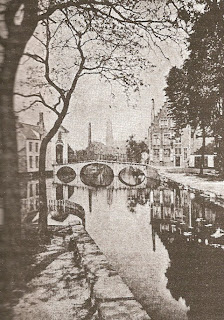

Places I would like to visit in Europe, in no order:
2. Bruges
2. Bruges
Picture #1- from this website: http://www.bc.edu/bc_org/avp/cas/fnart/arch/bruges_arch.html
Picture #2- from this blog: http://sebald.wordpress.com/category/eugene-atget/
I first heard about Bruges a couple of years ago when I read the novel by George Rodenbach, Bruges-la-Morte. The Symbolist novel is heavily colored with languid prose about a widower's grief. It prominently features the city and the city's decaying repose.
And a great article from this blog:
http://symbolabs.blogspot.com/2007/01/three-symbolist-cities-bruges-ravenna.html
http://symbolabs.blogspot.com/2007/01/three-symbolist-cities-bruges-ravenna.html
History:
Bruges (Brugge) was founded in the 9th century by Vikings who settled here at the end of the little river 'de Reie'. The name Bruges is probably derived from the old-Scandinavian word 'Brygga', which means 'harbor, or mooring place'. Because of the proximity of the North Sea, the settlement very quickly became an important international harbor. A sea-arm, called the Zwin, connected Bruges with the North Sea. The young settlement acquired city rights as early as the 12th century. At that time a first protective wall was built around Bruges.
Already in the 13th century Bruges was an important international trading center. Traders from all over the then known world came to the city to sell their products to each other and to buy Flemish cloth, a internationally acclaimed textile product, produced in different Flemish cities (e.g. Gent). In the early 14th century Bruges was the scene of political unrest between the citizens and the count of Flanders. Because of this unrest the French king tried to annex the county of Flanders, but the population managed to kick out the French garisson on May the 18th 1302. Later the Flemish army beat the French army in the 'Battle of the Golden Spurs' on July the 11th in the Flemish city of Kortrijk.
Bruges (Brugge) was founded in the 9th century by Vikings who settled here at the end of the little river 'de Reie'. The name Bruges is probably derived from the old-Scandinavian word 'Brygga', which means 'harbor, or mooring place'. Because of the proximity of the North Sea, the settlement very quickly became an important international harbor. A sea-arm, called the Zwin, connected Bruges with the North Sea. The young settlement acquired city rights as early as the 12th century. At that time a first protective wall was built around Bruges.
Already in the 13th century Bruges was an important international trading center. Traders from all over the then known world came to the city to sell their products to each other and to buy Flemish cloth, a internationally acclaimed textile product, produced in different Flemish cities (e.g. Gent). In the early 14th century Bruges was the scene of political unrest between the citizens and the count of Flanders. Because of this unrest the French king tried to annex the county of Flanders, but the population managed to kick out the French garisson on May the 18th 1302. Later the Flemish army beat the French army in the 'Battle of the Golden Spurs' on July the 11th in the Flemish city of Kortrijk.
In the 14th century Bruges turned also into an international financial and trading center. Several countries had their own representation in Bruges: the Italians, the Germans, the Scottish, the Spanish made the city into a true European center where different languages could be heard and where the most exotic products could be found.
The decline of Bruges' wealth started in the 15th century : the unstoppable silting up of the Zwin, the competition with the bigger harbor of Antwerp and the crisis in the cloth industry resulted in less commercial activity. The crisis, however, was not immediately noticable. Bruges continued to construct splendid late-gothic buildings and churches, and the Flemish painting school (with e.g. the brothers Van Eyck and Hans Memling ) started to flourish as never before.
By the end of the 16th century the former glory was only a memory and Bruges slipped into a wintersleep that took several centuries. New textile industries were introduced in the 19th century, but to no avail. In the middle of the 1800's Brugge was the poorest city in Belgium.